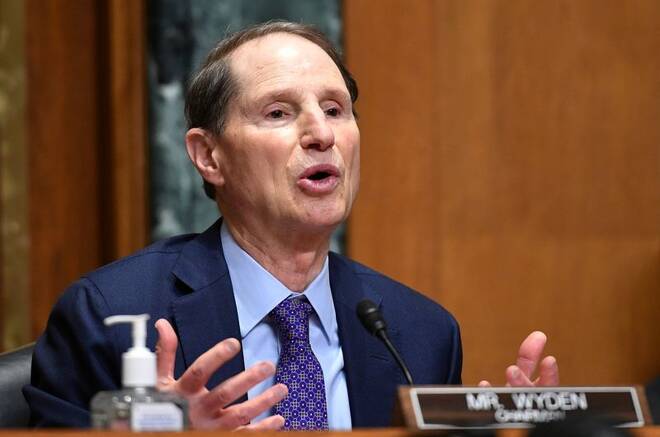Advertisement
Advertisement
U.S. Senate finance chair to propose tax on excess oil profits
By:
(Reuters) - U.S. Senate Finance Committee chair Ron Wyden will propose a 21% surtax on oil company profits that are considered to be excessive, a Bloomberg reporter tweeted on Tuesday.
By David Shepardson
WASHINGTON (Reuters) – U.S. Senate Finance Committee chair Ron Wyden is planning to introduce legislation setting a 21% surtax on oil company profits considered excessive, an aide for the senator told Reuters.
The bill applies a 21% additional tax on the excess profits of oil and gas companies with more than $1 billion in annual revenue, the aide said. The 21% tax would be in addition to any regular income tax due. Profits over 10% would be considered excessive under the bill, according to the aide.
Unlike other proposed windfall profit taxes, the aide said, Wyden’s bill would apply the tax based on profit margins, not oil prices.
“While Americans pay more to fill up their gas tanks, Big Oil companies are raking in record profits, rewarding their CEOs and wealthy shareholders with massive stock buybacks, and using special loopholes in the tax code to pay next to nothing in taxes,” Wyden, a Democrat, said in a statement.
The American Petroleum Institute, the top U.S. oil lobby organization, said “policymakers should be focused on increasing energy supply and reducing costs for Americans. Imposing new taxes on our industry will do the exact opposite and only discourage investment at a time when it’s needed most.”
President Joe Biden on Friday accused the U.S. oil industry, and Exxon Mobil Corp in particular, of capitalizing on a supply shortage to fatten profits after a report showed inflation surging to a new 40-year record.
In May, the U.S. House passed a bill that would allow Biden to issue an energy emergency declaration, making it unlawful for companies to excessively increase gasoline and home fuel prices.
The Senate, evenly divided at 50 members in each party, needs 60 votes — including 10 Republicans — to pass most legislation.
Bloomberg first reported the planned legislation.
(Reporting by David Shepardson; Writing by Doina Chiacu; Editing by Lisa Shumaker)
About the Author
Reuterscontributor
Reuters, the news and media division of Thomson Reuters, is the world’s largest international multimedia news provider reaching more than one billion people every day. Reuters provides trusted business, financial, national, and international news to professionals via Thomson Reuters desktops, the world's media organizations, and directly to consumers at Reuters.com and via Reuters TV. Learn more about Thomson Reuters products:
Latest news and analysis
Advertisement
